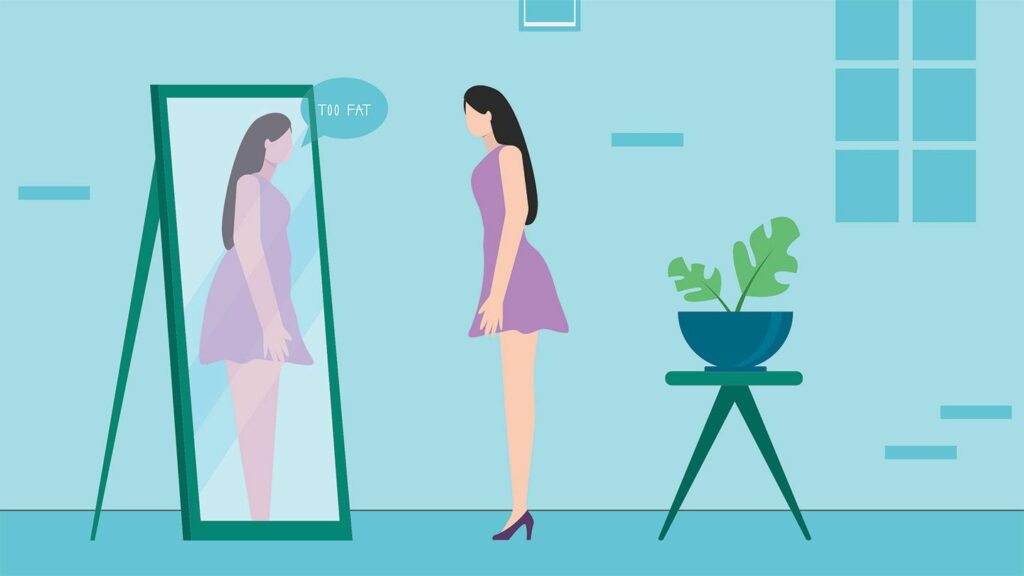Do you sometimes feel like you’re not in control of your eating? You’re not alone. Many people struggle with their eating habits and may engage in disordered eating behaviors. These are behaviors that can be harmful to your physical and emotional health and can lead to an eating disorder. In this blog post, we will discuss the different types of eating disorder behaviors, as well as the signs and symptoms of each one. If you think you may be struggling with an eating disorder, please seek professional help.
Contents
What Does Eating Disorder Behaviors Mean?
 Eating disorder behaviors are a range of actions and attitudes surrounding food, weight, and body shape. They can involve excesses or restrictions in eating, unrealistic body image goals, and abnormal eating habits. Eating disorders often develop in adolescence or young adulthood, but they can occur at any age.
Eating disorder behaviors are a range of actions and attitudes surrounding food, weight, and body shape. They can involve excesses or restrictions in eating, unrealistic body image goals, and abnormal eating habits. Eating disorders often develop in adolescence or young adulthood, but they can occur at any age.
The behaviors are simply described as “disordered eating.” Many different types of disordered eating exist, and not all of them rise to the level of an eating disorder as defined by the Diagnostic and Statistical Manual of Mental Disorders (DSM). The DSM is the gold-standard reference book for mental health professionals in the United States.
Eating disorders surround 3 main types of disorders: anorexia nervosa, bulimia nervosa, and binge-eating disorder. It is believed that 1 in 200 women suffer from anorexia, 1 in 100 women suffer from bulimia, and as many as 5% of Americans experience binge-eating disorder in their lifetime.
Therefore, if you feel like you may be suffering from any type of eating disorder, it is important to seek professional help.
What Are Some Different Eating Disorder Behaviors?
There are many different types of eating disorder behaviors. Some people may only have one type of behavior, while others may have several. The most common types of eating disorder behaviors include:
Binge Eating
This type of behavior is characterized by eating large amounts of food in a short period of time. People who binge eat often feel out of control during these episodes. This behavior is often followed by feelings of guilt and shame. For example, someone with this disorder may eat an entire pint of ice cream in one sitting.
Restrictive Eating
This type of behavior is characterized by limiting the amount of food that you eat. People who restrict their eating may do so for a variety of reasons, including weight loss or to avoid gaining weight. This type of behavior can lead to severe malnutrition and other health complications. For example, someone with anorexia nervosa may severely restrict their caloric intake to the point where they are dangerously underweight.
Purging
It is one of the eating disorder behavior characterized by self-induced vomiting or the use of laxatives, diuretics, or enemas after eating. People who purge do so to rid their bodies of calories and prevent weight gain. For example, a person with bulimia nervosa may purge after eating to try to prevent weight gain.
Laxative misuse
 Sometimes, people with eating disorders will misuse laxatives as a way to lose weight. This can be extremely dangerous and lead to serious medical complications, such as dehydration, electrolyte imbalance, and even death. This type of eating disorder behavior is often a sign that someone is in need of immediate medical attention.
Sometimes, people with eating disorders will misuse laxatives as a way to lose weight. This can be extremely dangerous and lead to serious medical complications, such as dehydration, electrolyte imbalance, and even death. This type of eating disorder behavior is often a sign that someone is in need of immediate medical attention.
These are a few types of eating disorder behaviors. If you or someone you know is exhibiting any of these signs, it’s important to seek professional help. Eating disorders are serious mental illnesses that can have devastating consequences if left untreated. Early intervention and treatment can make a big difference in recovery.
How To Identify Them?
It might seem like a silly question, but many people do not know what eating disorder behaviors are. And even if you think you do, it is important to be able to identify them so that you can get help if needed. There are many different types of eating disorders, and each one has its own specific set of behaviors.
However, there are some general behaviors that are common to most eating disorders. If you or someone you know is exhibiting any of the following behaviors, it could be a sign of an eating disorder:
- Preoccupation with food, weight, and appearance
- Refusal to eat certain foods or obsessively counting calories
- Excessive exercise
- Making excuses to avoid eating meals
- Binge eating followed by purging
- Hoarding food
- Secretive eating
- Constant dieting
- Disruption in normal eating patterns
If you or someone you know is exhibiting any of these behaviors, it is important to seek professional help. Eating disorders are serious mental illnesses that can have devastating consequences if left untreated.
You should not try to diagnose yourself or someone else with an eating disorder. Only a professional can make a diagnosis. But if you are concerned about someone’s eating behaviors, you can encourage them to seek help from a qualified mental health professional.
How Do Eating Disorder Behaviors Impact Life?
 There are a variety of ways in which eating disorder behaviors can impact an individual’s life. The most direct way that these behaviors can impact someone’s life is by causing them to miss out on important nutrients that the body needs to function. This can lead to a host of health problems, both mental and physical.
There are a variety of ways in which eating disorder behaviors can impact an individual’s life. The most direct way that these behaviors can impact someone’s life is by causing them to miss out on important nutrients that the body needs to function. This can lead to a host of health problems, both mental and physical.
Another way that eating disorder behaviors can impact someone’s life is by causing them to miss out on important social activities. Many people with eating disorders isolate themselves from friends and family members, which can lead to feelings of loneliness and isolation.
Finally, it can be very difficult to maintain a job or go to school when dealing with an eating disorder. The time and energy that is required to manage the disorder can take away from other aspects of life.
In addition, there can be other impacts on life such as:
- Impacts on fertility
- Intimate partner relationships
- Parenting
While eating disorder behaviors can have a significant impact on many different aspects of an individual’s life, it is important to remember that treatment is available and recovery is possible. With the right support, people with eating disorders can go on to lead happy and healthy lives.
How To Diagnose It?
The diagnosis might be made by a mental health professional, such as a psychiatrist, psychologist, or clinical social worker. The diagnosis is based on the person’s self-reported thoughts, feelings, and behaviors. A physical exam can also be done to check for signs of malnutrition or other medical problems that can be caused by an eating disorder.
In addition, it is important to rule out other conditions that might be causing the symptoms. For example, some medical conditions can cause weight loss or changes in eating habits. And some psychiatric conditions, such as anxiety disorders and depression, can also cause similar symptoms.
Therefore, a thorough evaluation usually includes:
- A physical exam
- A complete medical history
- Psychological testing
- Laboratory tests, such as a blood test to check for anemia or chemical imbalance
With these things, the mental health professional can rule out other conditions and make a diagnosis. Only with an accurate diagnosis can the person get the proper treatment.
How Is It Treated?
Eating disorders are serious mental illnesses that can have life-threatening consequences. It is estimated that 20% of people with eating disorders die from their condition. It is important to get professional help if you or someone you know has signs of an eating disorder.
Treatment may require working with a team of healthcare providers, which could include a registered dietitian, therapist, and physician. Let’s discuss some of the different types of treatments that are available.
Therapy
 It is common for people with eating disorders to see a therapist. This could be a licensed clinical psychologist, psychiatrist, or other mental health professional. Therapy can help address the underlying causes of an eating disorder and develop new coping skills. There are several types of therapy that may be used to treat eating disorders, including:
It is common for people with eating disorders to see a therapist. This could be a licensed clinical psychologist, psychiatrist, or other mental health professional. Therapy can help address the underlying causes of an eating disorder and develop new coping skills. There are several types of therapy that may be used to treat eating disorders, including:
- Cognitive behavioral therapy (CBT)
- Interpersonal therapy
- Family-based therapy
- Dialectical behavioral therapy
These types of therapy can be conducted in an individual, group, or family setting.
Medical Management
In some cases, people with eating disorders may need to see a physician for medical management. This could be a primary care doctor or a specialist such as a gastroenterologist, endocrinologist, or nutritionist. Medical management may include:
- Monitoring vital signs
- Checking for electrolyte abnormalities
- Administering IV fluids
- Prescribing medications
Nutritional counseling
It is vital for our physical and mental well-being. Eating disorders involve a range of dangerous behaviors that interfere with proper nutrition. Nutritional counseling can be very helpful in cases of anorexia, bulimia, and other disorders. It is a type of therapy that helps people make better choices about food and nutrition.
Counselors work with patients to develop a healthy relationship with food. They also help patients overcome any negative thoughts or behaviors around eating. Nutritional counseling can be done one-on-one or in a group setting.
Join a support group
A group can provide moral support and practical advice. You can find online or in-person support groups for people with eating disorders. There are also support groups for family members and friends. Look for a group that:
1) is led by a mental health professional,
2) has a format that feels comfortable to you, and
3) has members you can relate to.
Some people with eating disorders may feel like they don’t need help. But getting professional treatment is always a good idea. If you’re not sure whether you have an eating disorder, consider talking to a mental health professional. He or she can assess your symptoms and let you know if you could benefit from treatment.
Self-help tips
 In addition to professional help, there are some things you can do to help manage your eating disorder behaviors.
In addition to professional help, there are some things you can do to help manage your eating disorder behaviors.
- Set realistic goals for yourself, both in terms of your eating and your weight.
- Avoid fad diets or any type of diet that requires you to severely restrict your food intake.
- Make sure to eat regular meals and snacks throughout the day.
- Avoid skipping meals or making yourself throw up after eating.
- Get regular exercise, but don’t overexercise to the point of exhaustion.
- Find a hobby or activity that you enjoy and make time for it in your schedule.
- Spend time with friends and family members who make you feel good about yourself.
- Avoid people or situations that trigger your eating disorder behaviors.
It is often believed that eating disorders only affect adolescent girls, but this is not the case. Eating disorders can affect people of any age, gender, or background. If you are struggling with an eating disorder, it is important to seek professional help. With treatment, you can learn how to manage your disorder and live a healthy and happy life.
Conclusion
In conclusion, eating disorder behaviors can have a negative impact on an individual’s physical and mental health. It is not something that should be taken lightly. If you or someone you know is exhibiting any of the behaviors mentioned above, it is important to seek professional help. Recovery is possible only with the right treatment.
Just make sure to avoid any type of self-judgment, and be accepting and understanding of yourself (or the person you’re helping). With the right help, anyone can overcome them.
If you are struggling then please contact Therapy Mantra for help. The team of experts here will be more than happy to help you out and get you on the path to a better life. Contact us today to learn more about our services. You can also book an online therapy session or download our free Android or iOS app.


